LONDON: Since the outbreak of civil war in Syria in 2011, Israel has repeatedly struck military targets on the nation’s territory. These attacks have sharply increased in frequency since the Gaza conflict erupted last October, with Israel seemingly free to act with impunity.
Following the Oct. 7, 2023, Hamas-led attack that triggered the war in Gaza, Israel has mounted strikes against suspected Iran-backed targets on Syrian soil, leaving Syrians fearful that their country could be dragged into a wider regional conflagration between Israel and Iran.
A similar scene has been unfolding in neighboring Lebanon, where Israel and the Iran-backed Hezbollah militia have been exchanging cross-border fire since Oct. 8 last year, resulting in hundreds of fatalities and the mass displacement of civilians.
On Monday, a suspected Israeli drone strike on a car near the Lebanon-Syria border killed Mohammed Baraa Katerji, 48, a prominent Syrian businessman who had close ties to the government of President Bashar Assad, according to an Associated Press report quoting pro-government media and an official from an Iran-backed group.
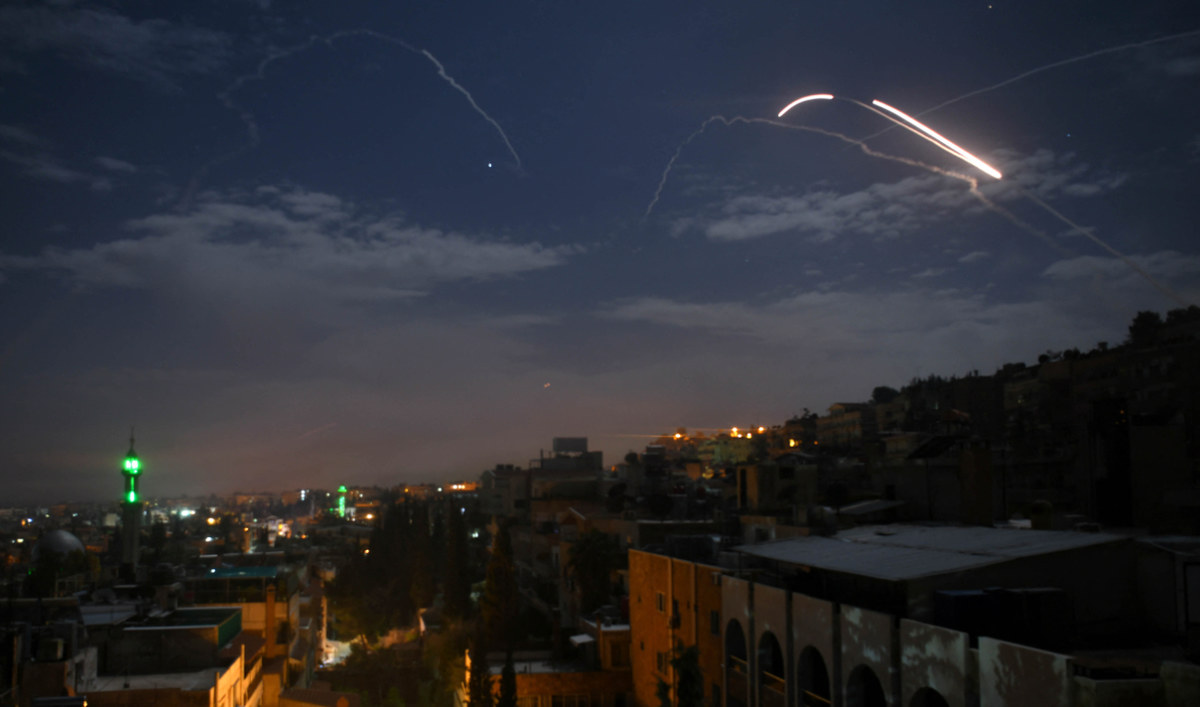
A picture taken on January 21, 2019 shows Syrian air defense batteries responding to what the Syrian state media said were Israeli missiles targeting Damascus. (AFP)
The pro-government Al-Watan daily quoted unnamed “sources” as saying that Katerji was killed in a “Zionist drone strike on his car.” Rami Abdurrahman, who heads the Britain-based opposition war monitor Syrian Observatory for Human Rights, said Katerji was apparently targeted because he used to fund the “Syrian resistance” against Israel in the Golan Heights, as well as his links to Iran-backed groups in Syria.
Israel rarely claims responsibility for such strikes on Syrian territory but has repeatedly given warning that it will not tolerate Iran gaining a military foothold there or using the country to transport advanced weapons to Hezbollah in Lebanon.
Although Syrian air defenses and the Assad regime’s Russian allies have occasionally intercepted Israeli missiles over Syrian territory, they have failed to deter Israeli attacks on military installations and commanders of Iran’s Islamic Revolutionary Guard Corps.
Indeed, at least 19 senior officials of the IRGC’s extraterritorial Quds Force have been killed in suspected Israeli strikes since Oct. 7, including top-ranking officer Mohammad Reza Zahedi.
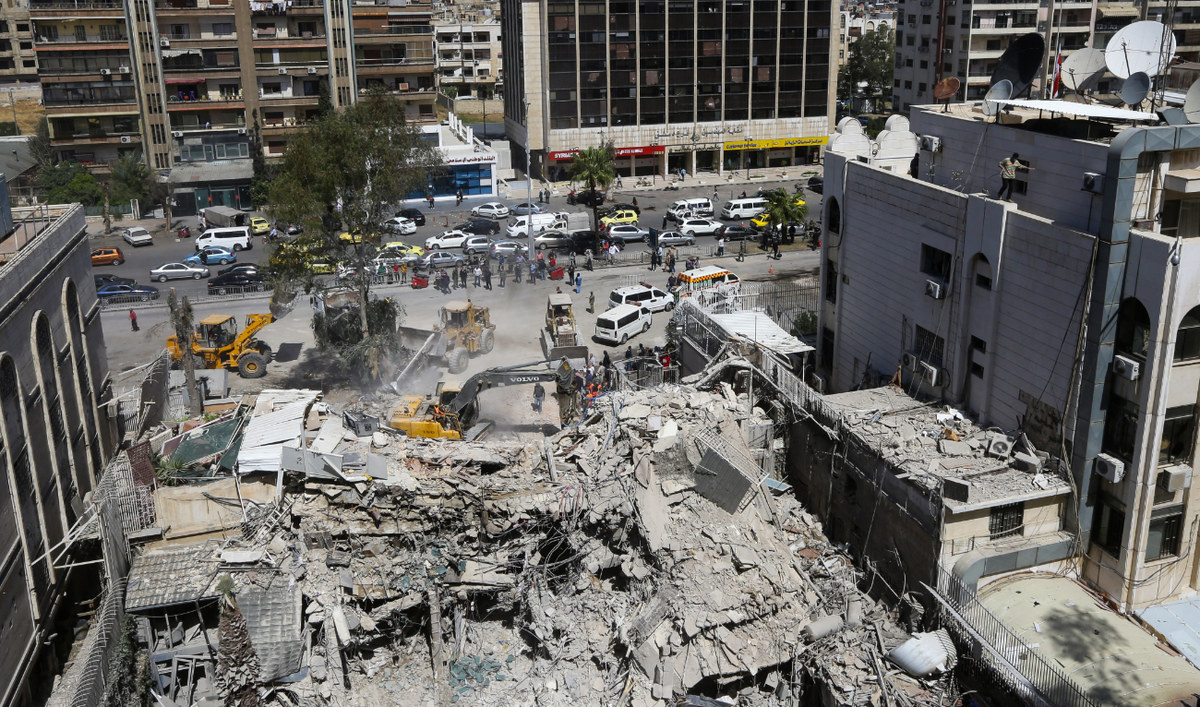
Rescue workers search in the rubble of a building annexed to the Iranian embassy a day after an air strike in Damascus on April 2, 2024. (AFP)
Israel’s ability to track high-profile targets and strike deep inside Syrian territory owes largely to its technological and military superiority and the comparative weakness of Syria’s defenses.
Joshua Landis, director of the Center for Middle East Studies at the University of Oklahoma, believes Israel has been attacking Syria for almost a decade simply because “Israel can.”
“Syria has no effective way to deter Israel from attacking it at will,” he told Arab News. “Israel has every incentive to destroy weapons sent to Syria from Iran or elsewhere, especially those that might end up strengthening Hezbollah.”
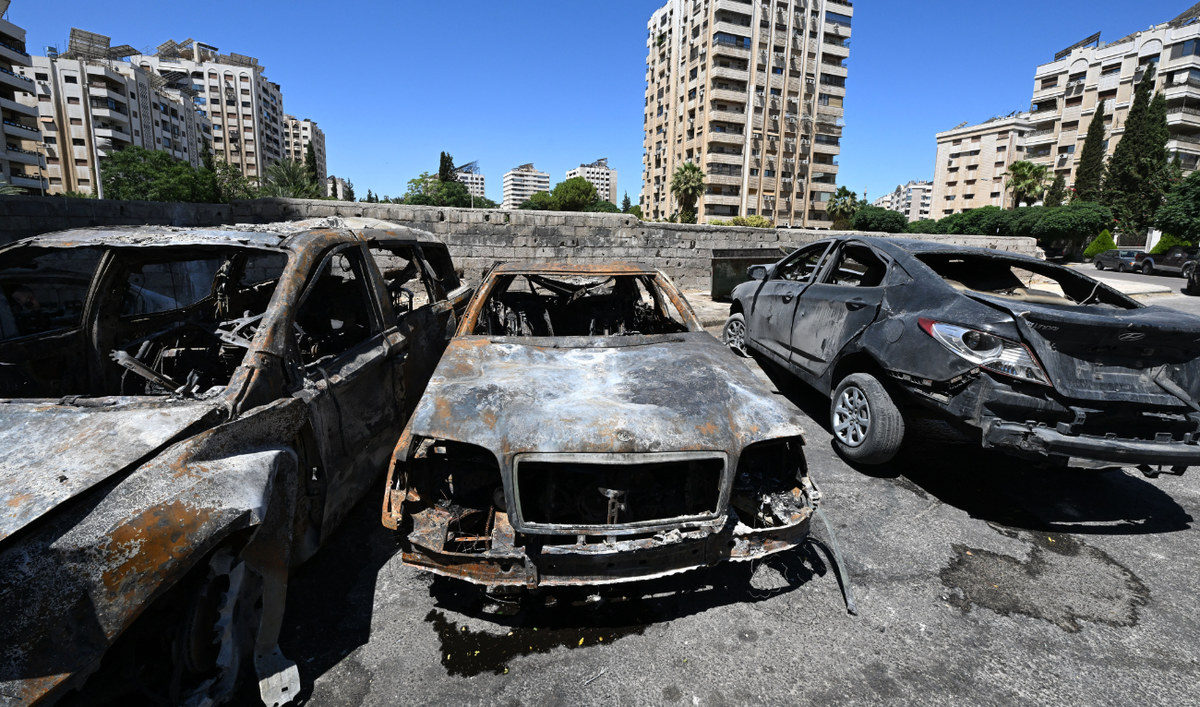
Charred cars lie in a parking lot in the aftermath of an Israeli strike in the neighbourhood of Kafr Sousse in Damascus, early on July 14, 2024. (AFP)
In late June, Israel reportedly struck multiple targets in southern Syria, including a pro-Iran service center and an IRGC stronghold in the Sayyida Zainab area south of Damascus, according to the UK-based Syrian Observatory for Human Rights.
SOHR said the suspected Israeli strike killed three people, including an elderly woman, and injured 11 others. State media cited a military source saying two people were killed and one soldier was injured. Syrian air defenses were activated but failed to repel the attack.
“Iran and Hezbollah have no answer to Israel’s technological superiority,” said Landis. “Syria’s air force is in shambles, its anti-aircraft missiles are inadequate, and Russia does not want to alienate Israel, which could easily seek revenge against Russia by helping Ukraine.”
The Israel Defense Forces saw its arms expenditure increase by more than 200 percent — from $1.8 billion in September to $4.7 billion in December 2023 — according to the Stockholm International Peace Research Institute.
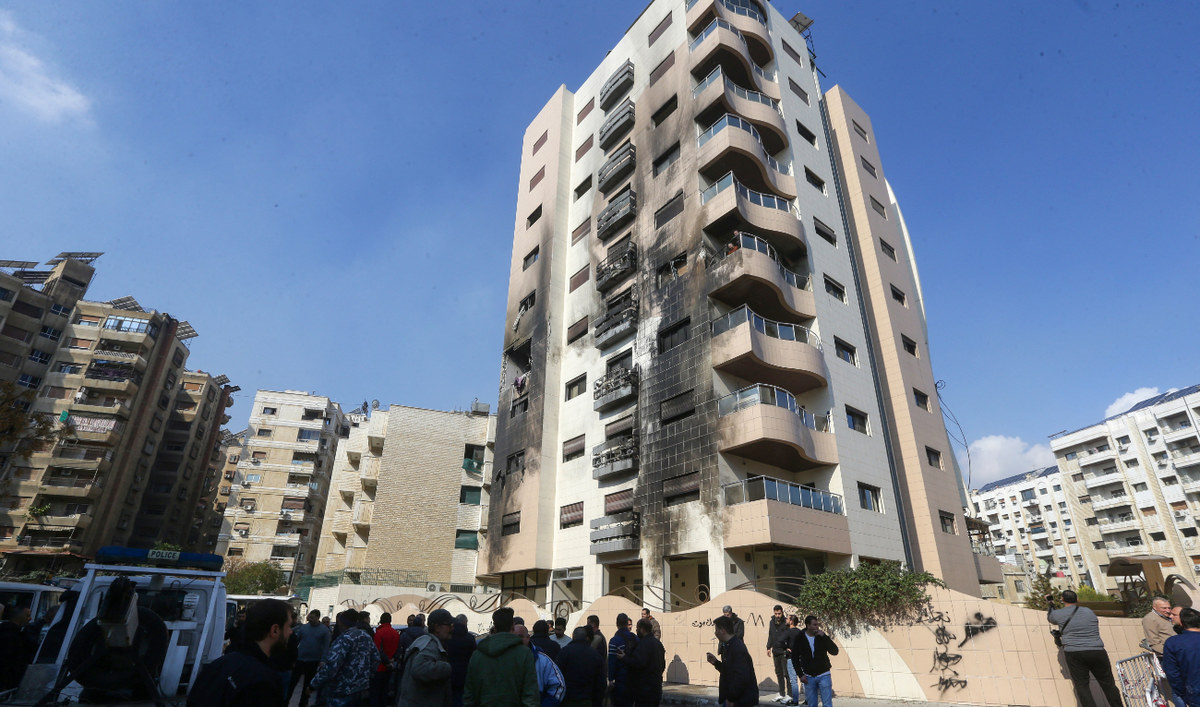
People gather outside a buildling reportedly targeted by Israeli air strikes in the Kafr Sousa district of the Syrian capital Damascus on February 21, 2024. (AFP)
Moreover, the US provides Israel with $3.8 billion in annual military aid, making it the IDF’s biggest arms supplier. Second to the US is Germany, which sold Israel $326.5 million worth of arms last year alone.
Calls by several UN rights experts and pro-Palestine activists for an arms embargo on Israel have fallen on deaf ears. Even a case brought by Nicaragua to the International Court of Justice to halt Germany’s arms sales to Israel was rejected in April.
Mohammed Al-Basha, a senior Middle East analyst at the research network Navanti Group, agrees with Landis that “Syrian government and Hezbollah aircraft defense and anti-aircraft capabilities are limited.”
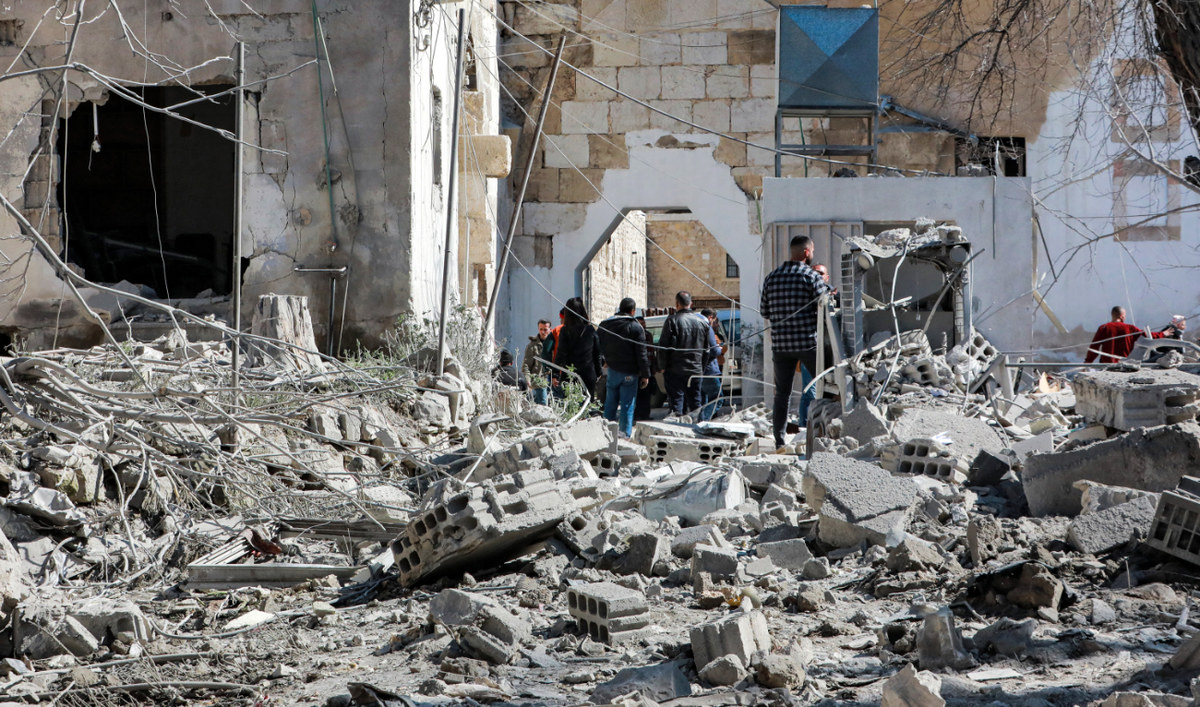
People inspect damage in the aftermath of an Israeli air strike that hit the medieval Citadel of Damascus on February 19, 2023. (AFP)
He told Arab News: “These capabilities are generally quite restricted and likely concentrated around key targets, such as Damascus.”
He added that the Syrian government and Hezbollah “primarily receive their air defense systems from countries like Russia, Iran, and possibly China.
“While Syria may have had some capacity to counter missile attacks five years ago, as evidenced by their response to a strike by US President Donald Trump’s administration … it is now likely that Russia is prioritizing these resources for its own conflicts in Ukraine, South Ossetia, and potentially Transnistria.”
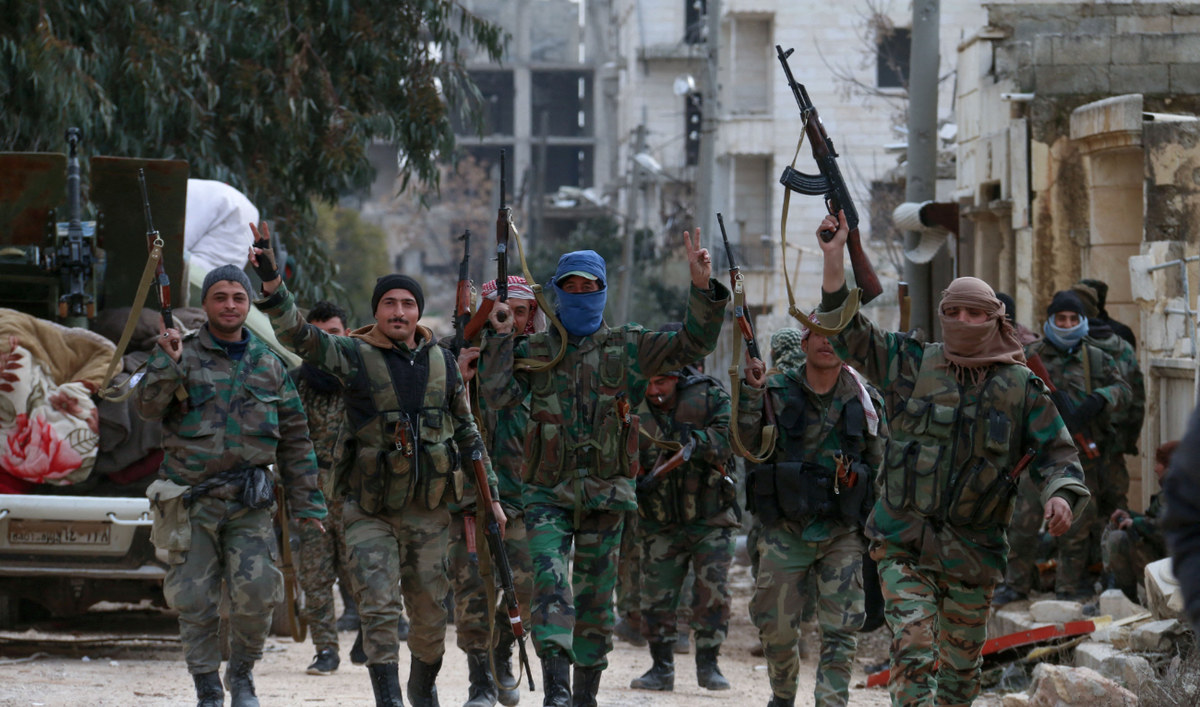
Members of the Syrian army deploy in the Al-Rashidin 1 district, in Aleppo’s southwestern countryside, on February 16, 2020. (AFP)
On April 14, 2018, the US, UK, and France fired more than 100 missiles at three government sites in Syria, claiming these were chemical weapons facilities. Russia said Syrian air defenses downed at least 71 incoming cruise missiles.
Whatever the condition of Syria’s air defenses today, Al-Basha stressed that “Israel’s air capabilities are almost certainly more advanced than those of the Syrian government and Hezbollah.”
While Syria may lack the means to meaningfully retaliate against Israel, the same cannot be said for Iran and its regional proxies, including Hezbollah in Lebanon, the Houthis in Yemen, and Al-Hashd Al-Sha’abi in Iraq — groups that collectively make up the “Axis of Resistance.”
On July 9, Hezbollah retaliated for the killing of a bodyguard of its leader Hassan Nasrallah by firing dozens of rockets into the Israeli-occupied Golan Heights, killing two people, according to Israeli police.
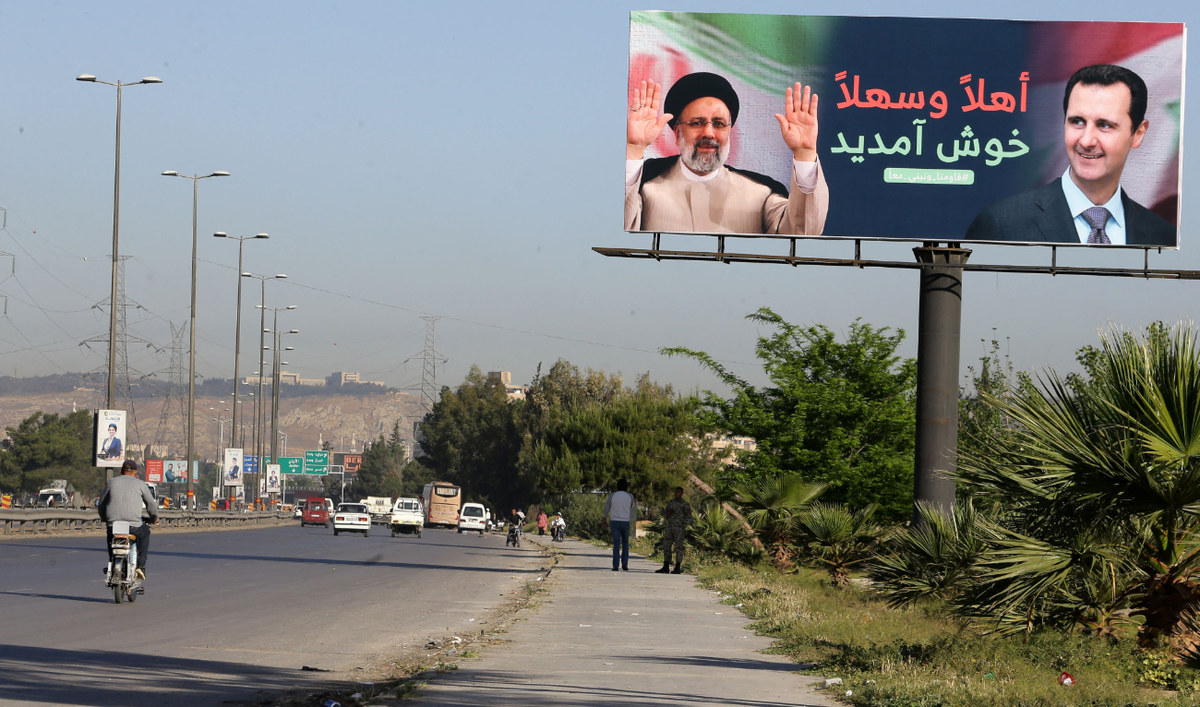
A billboard with pictures of late Iranian President Ibrahim Raisi (L) and Syrian President Bashar Al-Assad stands on the road leading to Damascus International Airport on May 3, 2023. (AFP)
Earlier that day, the bodyguard’s vehicle had been hit with an Israeli shell in Syrian territory on the Damascus-Beirut highway, Reuters reported.
The killing of senior Hezbollah commander Mohammed Nasser in southern Lebanon on July 3 also did not go unpunished. The following day, the militia said it launched more than 200 rockets and a swarm of drones at 10 Israeli military sites.
War-shattered Syria, by contrast, appears to Israel as a soft target.
Syrian-Canadian analyst Camille Alexandre Otrakji told Arab News that by targeting Syria, Israel “strategically targets both the broader resistance camp and Syria specifically.
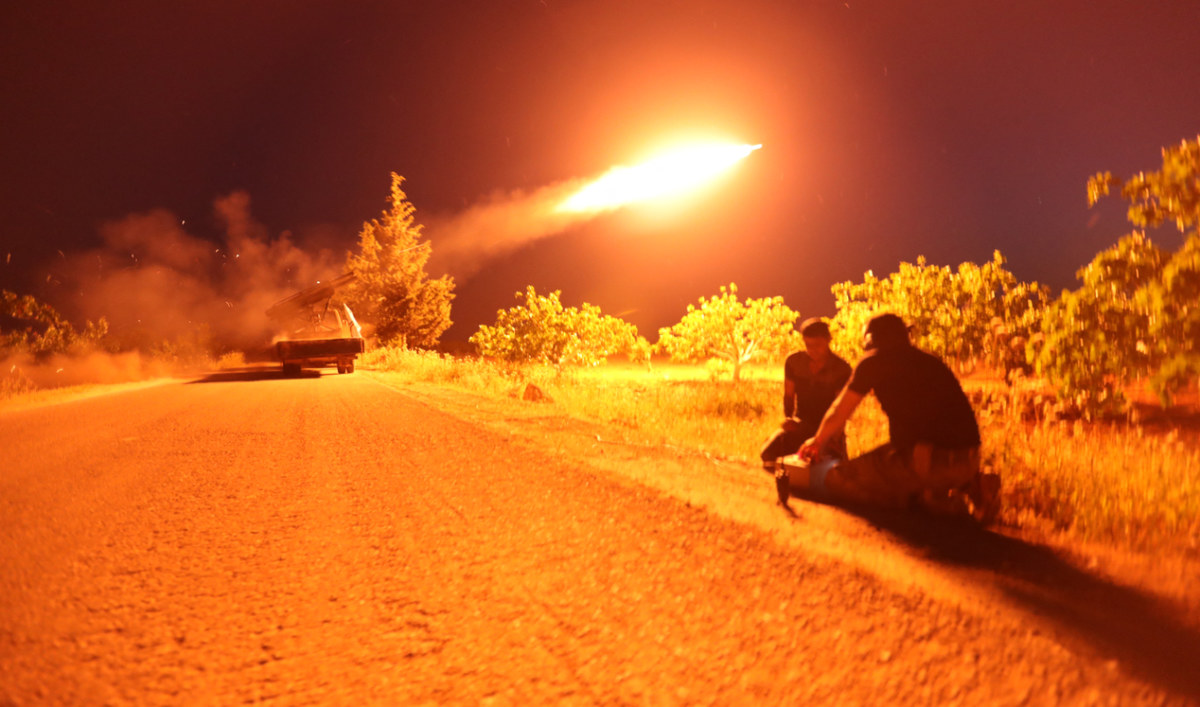
Syrian fighters from the Turkish-backed National Liberation Front (NLF) fire a missile against regime positions on May 13, 2019 in the rebel-held northern part of Syria’s Hama province. (AFP)
“Israel is attempting to weaken the overall capabilities of the resistance camp, with Syria being a relatively safe target compared to other regional resistance actors,” he said.
“If Israel targets non-state actors in Lebanon, Yemen, or Iraq, it would likely face retaliatory attacks. Unlike Syria, these actors are not constrained by international agreements, complicating their decision to retaliate against Israel.”
The Baathist regime itself, however, has also long been considered a sworn enemy by Israel.
Pointing out that Syria’s army “has been significantly weakened” by 13 years of civil war, Otrakji said Damascus “faces a more challenging situation,” and “its close allies are not all supportive of a decision to escalate toward military confrontation with Israel.”
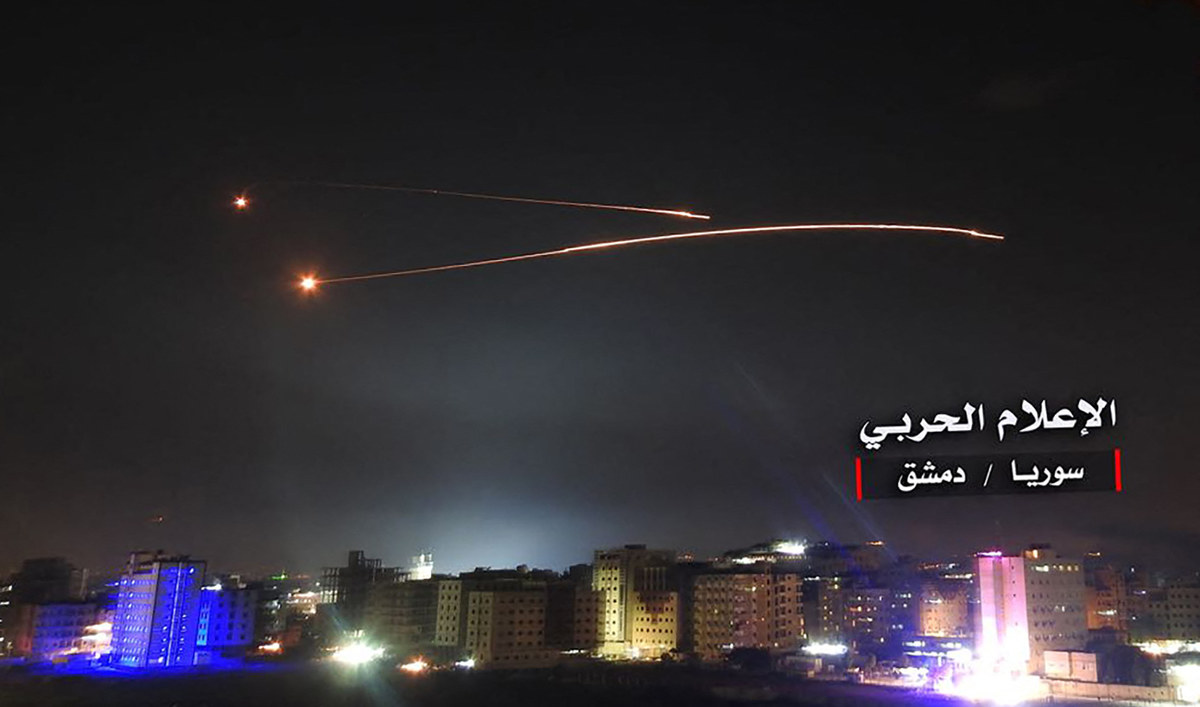
An image released on May 10, 2018 reportedly shows Syrian air defense systems intercepting Israeli missiles over Damascus’ airspace. (AFP)
He added: “Syrians legitimately claim that Damascus is the world’s oldest continuously inhabited capital. With comparable validity, they also assert that Syria holds the oldest continuously inhabited position within the resistance axis.
“Since 1947, Syria has frequently opposed Israeli and American initiatives in the Middle East with varying degrees of intensity.
“In a CIA analysis document titled ‘Israel: Perceptions of Syria,’ declassified in 2011 and obtained under the Freedom of Information Act, CIA analysts noted that ‘Israelis, both in and out of government, view Syria as Israel’s most determined enemy.’
“The document further states, ‘Most Israelis foresee an extended period of internal unrest in Syria after Assad leaves the scene … the Israelis believe it would weaken Syria’s position in the region and force the successor regime to turn inward.’”

Syrian President Bashar Al-Assad listening to army soldiers in Al-Habit on the southern edges of the Idlib province on October 22, 2019. (AFP)
Otrakji argues that “although Israel cannot deploy its full military might to achieve its long-term goal of creating a power vacuum in Syria, it can pursue this objective gradually.”
He explained that “this slow-paced approach appears to be welcomed by the international community, serving as an additional means to pressure Syria’s leadership into making further compromises.”
While Israel is expected to continue mounting attacks on Syrian territory, Landis of the University of Oklahoma does not foresee Syria becoming the primary battlefield in Israel’s shadow war with Iran.
“Syria will not be the main battlefield, but Israel will strike any arms depots or manufacturing sites in Syria that may resupply Hezbollah,” he said.
“If Iran tries to reinforce Hezbollah through Syria, Israel will be sure to attack Syria in an effort to stop arms from reaching Lebanon.”





























